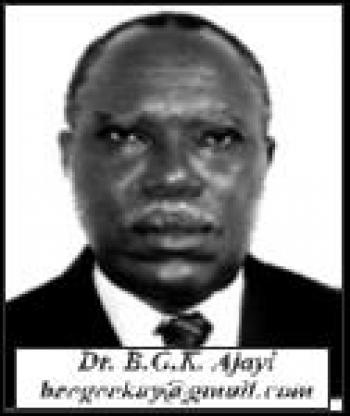NEVER SHUT THE DOOR TO HOPE ON ONE’S FACE

|
MR DANIEL, AN 80YEAR old man, travelled a long distance to see a doctor. He had been blind for over ten years. He could not recount how many eye clinics and hospitals he had visited before. On the advice of a friend, he had come to this particular clinic with great expectations and was full of hope, confident that, at last, he would get his sight restored. “Papa, your eyes are very bad. You have come too late. I wished I had seen you 10years earlier but now there is nothing I can do,” the doctor told him bluntly. Devastated, Mr. Daniel went away speechless. However, about two weeks later, he returned to express his displeasure to the doctor. “You are heartless,” he said. “I came with great expectations and you just shattered my hope! Did you expect me to go and commit suicide?” I remember my first visit to a teaching hospital very many years ago. I had arrived at 6.00 am and at about 12.00 noon, hunger had set in. I was famished, feeling faint and seriously considered giving up seeing the doctor. Just then, the doctor came in with a note pad in one hand and a pen in the other. I was one of the over a hundred patients sitting in rows on the benches waiting to see her. Before I finished narrating my complaints, she had completed writing her prescription. Without a word, she thrust it into my hand and moved on to the next patient. I looked at the prescription and it looked to me like Chinese letters. I could neither decipher the names of the prescribed medicines nor understand the medical jargon. I asked one of the hospital attendants to explain it all to me. She told me I should wait until I got to the pharmacy. “Have I come here to waste the whole day?” I muttered to myself. Reluctantly, I went to the pharmacy and after another agonising wait of over two hours, had my drugs dispensed. The dispenser was clearly too busy and asking questions would have elicited no response. In any case, the pangs of hunger were taking their toll on me so I decided I would just follow the instructions on the labels. Back to school, the house master asked me, “what did the doctor say was wrong with you?” I said I did not know and that he didn’t tell me. “You spent over a whole day in the hospital seeing the doctor and he didn’t tell you what was wrong with you. Okay what drugs did he give you?” I showed him the packages and the bottles. “All medicines have names and there are no names on yours! Do you realise what would happen if you were to become ill suddenly after taking one of these and you were rushed to another hospital? The first thing the doctor there would ask you is the name of the medicine you had taken. He might also want to give you some other medicines which may interact with the ones you have been given. You would make it difficult for him to help you. Imagine if your life depended on it, you should consider yourself dead! I thought you were smarter than that! You must be an idiot of some sort!” he exclaimed. Not finished with me yet, he continued, “Young man, when next you go to a hospital you must ask the doctor the nature of your illness (diagnosis). You should ask for the possible outcome (prognosis) of the illness and the names and the probable side effects of the drugs you have been given. If possible get the doctor to write the information on a piece of paper for you. Your life may depend on it.” Quite often, given the type of environment in which we live and the ease with which any medicine can be purchased without a prescription, despite the commendable efforts of the Pharmaceutical Society of Nigeria, many medical doctors would tarry a little before giving out the names of some medications in the best interest of the patient. Now back to Mr. Daniel. His reaction was right. In giving him the prognosis, I would expect consideration for his feelings. No-one goes to his friend and tells him “Your darling wife had an accident a few hours ago and is dead!” Truth must be told but with consideration for feelings and if possible at the appropriate place and time. The medical doctor is not God. Once in a while the “impossible” happens. The door to “hope” must be never be shut in anyone’s face. |
© 2024 - Catholic Archdiocese of Ibadan





